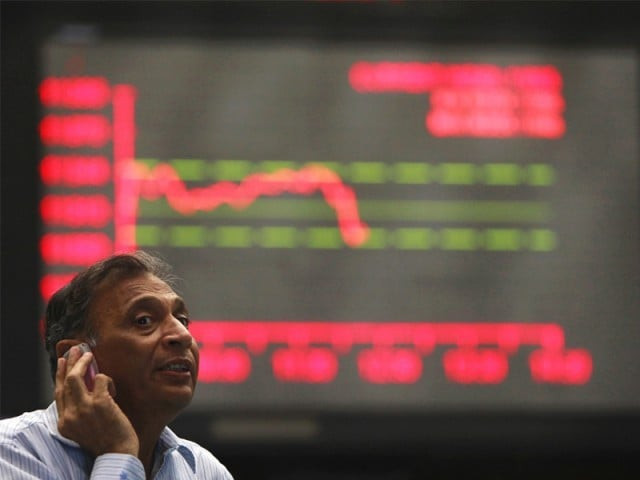Contract rollovers, foreign outflows hit PSX
KSE-100 index drops 1,991 points, settles at 110,423

Pakistan Stock Exchange (PSX) on Thursday came under heavy selling pressure and lost nearly 2,000 points as investors rebalanced their portfolios and engaged in profit-taking amid year-end volatility.
The market's negative momentum was also fuelled by sudden border tensions with Afghanistan. As the year was approaching its end, investors felt additional pressure from the rollover of future contracts, a weak rupee and foreign fund outflows.
Earlier in the morning, the market opened stable following a day's closure on account of Quaid-e-Azam's birth anniversary. However, selling pressure quickly drove the KSE-100 index down.
Though the market recovered well before midday, it once again started falling and touched the intra-day low of 109,859 towards the close of trading.
"Stocks closed sharply lower amid political uncertainty, concerns over cautious State Bank's policy easing and uncertainty about the outcome of slippages in tax collection targets," Arif Habib Corp MD Ahsan Mehanti observed.
Pressure emerging from future contracts rollover, weak rupee and foreign fund outflows was the catalyst for bearish activity, he added.
At the end of trading, the benchmark KSE-100 index registered a substantial decline of 1,991.49 points, or 1.77%, and settled at 110,423.32.
Topline Securities wrote in its review that the benchmark index experienced a decline, closing the session down by 1,991 points.
The market was influenced by increased leverage and the expiry of December contracts. Furthermore, security concerns over the situation along borders affected investor sentiment, it said.
Primary drivers of the downward movement were Fauji Fertiliser Company, Oil and Gas Development Company, Pakistan Petroleum, Mari Petroleum and Lucky Cement, which collectively accounted for a drop of 996 points in the index, Topline added.
Arif Habib Limited (AHL) noted in its report that the KSE-100 index saw a follow-through downside, losing 1.77% day-on-day.
Some 23 shares rose and 74 declined, with United Bank (+2.67%), TRG Pakistan (+9.87%) and MCB Bank (+1.67%) contributing the most to index gains.
On the other hand, Fauji Fertiliser Company (-2.92%), Oil and Gas Development Company (-4.65%) and Pakistan Petroleum (-4.34%) were the biggest drags, it said.
AHL expected inflation in December 2024 to fall to 4.1% year-on-year, down from 4.9% in the previous month. On a monthly basis, it projected a slight rise of 0.07%. "This marks the lowest inflation reading since April 2018, when it stood at 3.96%."
For CY24, average inflation was estimated at 13.13%, a significant reduction from 30.9% in CY23, it added.
JS Global analyst Muhammad Hasan Ather commented that the KSE-100 index's 1.8% slump was driven by rising leverage, year-end portfolio adjustments and border security concerns.
Despite bearish sentiment, the market's earnings yields suggested the potential for above-average long-term returns, he said.
Additionally, falling interest rates and lower returns on alternative investments indicated that equities would remain attractive, providing promising opportunities for investors, Ather anticipated.
Analysts at KTrade Securities highlighted that escalating tensions, particularly along the border, and impending transition to a new US administration contributed to the downturn at the PSX.
Overall trading volumes decreased to 628.03 million shares compared with Tuesday's tally of 880.6 million.
Shares of 450 companies were traded. Of these, 113 stocks closed higher, 284 fell and 53 remained unchanged.
Fauji Foods was the volume leader with trading in 93.3 million shares, gaining Rs1.44 to close at Rs16.39. It was followed by WorldCall Telecom with 49.9 million shares, losing Rs0.06 to close at Rs1.72 and TRG Pakistan with 46.9 million shares, gaining Rs6.33 to close at Rs70.45.
During the day, foreign investors bought shares worth Rs35.5 million, the National Clearing Company of Pakistan reported.



















COMMENTS
Comments are moderated and generally will be posted if they are on-topic and not abusive.
For more information, please see our Comments FAQ